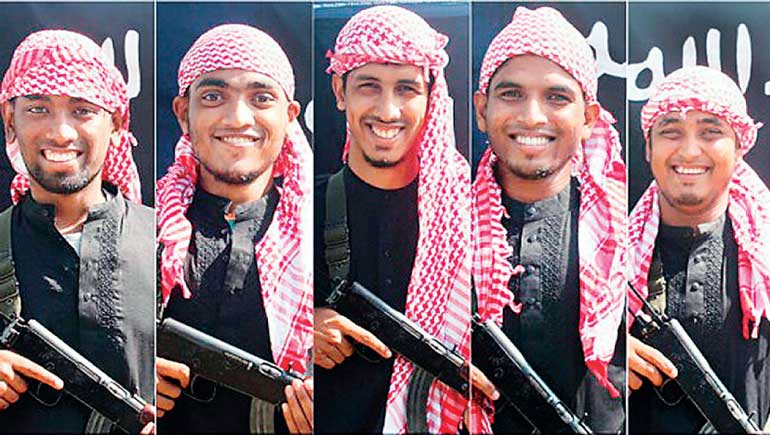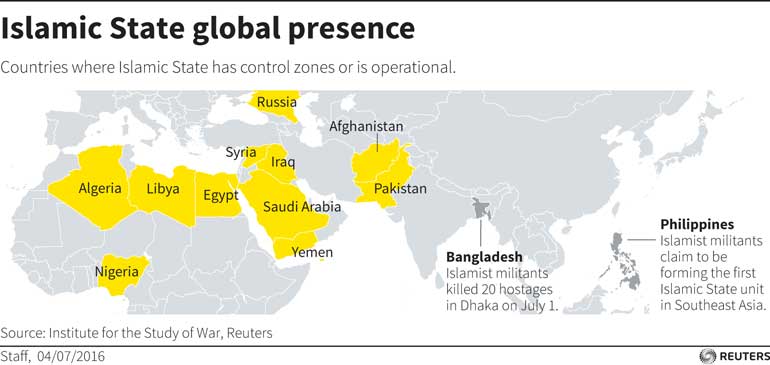Thursday Feb 26, 2026
Thursday Feb 26, 2026
Wednesday, 6 July 2016 00:00 - - {{hitsCtrl.values.hits}}

 Reuters: Until late 2014, Nibras Islam appeared to acquaintances to be a typical student: fun-loving, in and out of love, and keen on sport, especially soccer. Women found him handsome.
Reuters: Until late 2014, Nibras Islam appeared to acquaintances to be a typical student: fun-loving, in and out of love, and keen on sport, especially soccer. Women found him handsome.
On a ‘confessions’ Facebook page for Monash University students, one anonymous admirer gushed in a post on 11 October that year: “Nibras Islam!! You are cute. But very hard to spot. Tell me when can I see you. Your smile just makes my day.”
On Friday night, police suspect Nibras was among at least six gunmen who attacked an upscale restaurant in his hometown Dhaka and brutally murdered 20 people, most of them foreigners. Police in Malaysia said that at least two of the militants had attended the Kuala Lumpur campus of Australia’s prestigious Monash University, although they did not name them.
They and four other gunmen were killed by security forces after a 12-hour siege, while a seventh suspected attacker is in police custody, Bangladesh police said.
The attack, claimed by Islamic State, is an alarming development for a nation that, long used to gritty street violence fanned by political tension between secularists and Islamists, is suddenly facing a far more sophisticated threat.
As investigators gather details about the militants, a profile is emerging of a band of educated youths from privileged backgrounds who had turned to radical Islamism only recently.
One was the son of a mid-ranking leader of the country’s ruling party, police said.
It is testing the long-held belief that poverty and lack of education are the main causes for militancy taking hold in South Asia.
“Earlier the people who were radicalised used to be poorer and educated in quasi-madrassas,” said Joyeeta Bhattacharjee, a Bangladesh expert at Observer Research Foundation in New Delhi. “These attackers are people from affluent backgrounds, liberal backgrounds.”
Masudur Rahman, a deputy police commissioner in Dhaka, told Reuters that the attackers were ‘educated and rich’ and, somewhere along the way, ‘brainwashed’.
It is still not clear when and how these young men – three of whom police said were younger than 22 – were radicalised.
But interviews with friends and acquaintances of Nibras and some of the other suspected attackers, as well as a review of their social media activity, offer early glimpses into how they started to change.
A student who knew Nibras from North South University, a private college in Dhaka where he went before moving to Malaysia, said he ran into him at a cafe in January and was surprised by the elaborate version of the ‘Salaam’ greeting he used.
“It’s usually just – ‘hey, salaam, how you doing man?’ But Nibras said the full version ... His approach that day seemed totally different,” said the student, who requested anonymity.
“I used to pray often in university, and I never saw him during prayer times at the prayer room.”
Privileged background
The annual fee for a bachelor’s course at Monash, a college with sprawling grounds and state-of-the-art sports facilities on the outskirts of the Malaysian capital, is nearly $ 9,000, at least six times the average income in Bangladesh.
A person who knew Nibras at Monash said he was pursuing an undergraduate degree in business. This person, who did not want to be identified, described him as someone who would hang out with friends and do what they did.
He loved pictures, especially of himself, the person said, so much so that his friends would tease him about it.
A scan of social media shows Nibras was crazy about a Bollywood actress, supported Liverpool soccer club and took selfies in cafes with friends.
He also had a girlfriend, whom he broke up with in 2014, the person who knew him at Monash said. On Twitter, where he put his age as 22, Nibras at one point tweeted mournfully about a broken relationship.
“You don’t need me anymore. Be happy with him. Everyone is better then (sic) me. You know where to find me,” he wrote.
Then he vanished from the campus sometime last year.
It is not clear why he left, but the person who knew him said his friends thought it was because he didn’t enjoy his stay at Monash and decided to pursue his education closer to home and family.
He started to withdraw from social media, stopping activity on sites such as Snapchat and Facebook. His Instagram account is still active.
Nibras followed only 10 Twitter accounts, one of which was @ShamiWitness, an influential handle run by Islamic State propagandist Mehdi Masroor Biswas, who was arrested in the Indian city of Bangalore last year.
He liked a tweet by Anjem Choudary, one of Britain’s most high-profile Islamist preachers, that was critical of France and its allies and was posted in January, 2015, shortly after the deadly militant attack on the offices of the French satirical publication Charlie Hebdo.
Two months before that, he had tweeted: “Goodbye for good”.
Less is known about Andaleeb Ahmed, who has also been linked to Monash and whose inactive Twitter account shows a photograph of young men playing soccer.
A Malaysian police source said that Ahmed was in Malaysia from 2012 to 2015 and after that went to Istanbul. Turkey is often used as a staging post for would-be militants intent on joining the front lines with Islamic State in Syria.
Another of the militants was university student Rohan Imtiaz, the son of the leader of the ruling Awami League party’s Dhaka City chapter and deputy head of the country’s Olympic association.
Mohammed Nuru Mian, a former security guard at an apartment block in an upmarket neighbourhood of Dhaka where Imtiaz used to stay, told Reuters the young man disappeared about seven or eight months ago.
He described Imtiaz as a ‘very calm and soft’ man who went to the mosque for prayers after attending college. “After his disappearance, his mother asked me to pray for him,” he said.
AFP (Dhaka): A Bangladeshi politician has spoken of his shock on discovering his son was one of the suspected gunmen who murdered foreign hostages, and said many young men from wealthy, educated families had gone missing.
Imtiaz Khan Babul said he was “stunned” to learn of his son Rohan’s involvement in the attack, and that he believed young Bangladeshi men were becoming radicalised online.
His comments came after Bangladesh’s home minister said the attackers who stormed the upmarket cafe on Friday night, taking dozens of diners hostage and killing 20, were highly educated and from wealthy families.
“We never imagined this,” said Babul, an official with the ruling Awami League party, in an interview with the BBC. “There was nothing at home, no books or anything to indicate that he was leaning that way. So we had no inkling.”
Babul, whose son was among those killed when Bangladeshi security forces stormed the cafe, said he had shared his concerns with friends in Dhaka.
“When I was searching for my son I found that many other boys are missing. Well-educated boys from good, educated families, children of professionals, government officers,” he said. “I used to share my sorrows with them. We do not know how this is happening.”
Six young men were shot dead Saturday (2) at the end of the all-night siege in a Dhaka cafe claimed by Islamic State. One was taken alive and is being questioned.
One of those killed may have been an innocent bystander, but among the remaining five are a graduate of Bangladesh’s leading private university, an 18-year-old student at an elite school, and Rohan, Babul’s son.
Another was a former madrasah student from the northern district of Bogra which is seen as a hotbed of Islamist radicalism.
The government has said all the attackers were members of the Jamaeytul Mujahdeen Bangladesh (JMB), a banned local Islamist group.
Singapore: Minister-in-charge of Muslim Affairs, Yaacob Ibrahim has expressed his shock and sadness over the recent bomb blasts in Malaysia, Bangladesh, Turkey, Indonesia and Saudi Arabia. In a Facebook post on Tuesday (5), Dr Yaacob called the attacks “senseless”.
He wrote: “The blast in the holy city of Medina is near the Prophet’s Mosque! These senseless acts of terror ignores the sanctity of human life, regardless of faith.”
Dr. Yaacob, who is also the Minister for Communications and Information, condemned the “barbaric acts” and said they do not represent Muslims around the world.
“The attacks on Muslim majority cities and countries, claiming lives of Muslims during the Holy month of Ramadan, confirm that their heinous acts are against Islam,” he added.
In a separate Facebook post on Tuesday, Home Affairs and Law Minister K. Shanmugam wrote that ISIS had planned the attacks on Puchong, Dhaka, Baghdad, Medina and Surakarta.
“The holy month of Ramadan is meant to be a period of charity and compassion. Instead, ISIS sees Ramadan as an opportune time to take away innocent lives, declaring that they would make it ‘a month of pain for infidels everywhere’. Even Muslims have not been spared,” Shanmugam wrote.